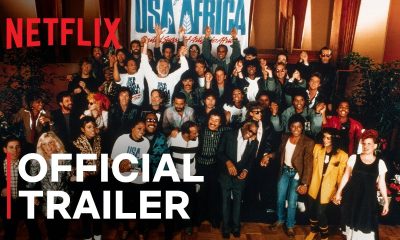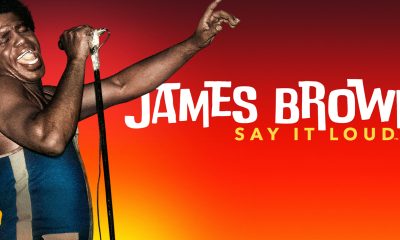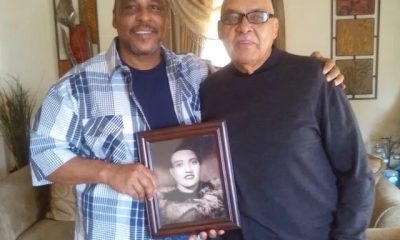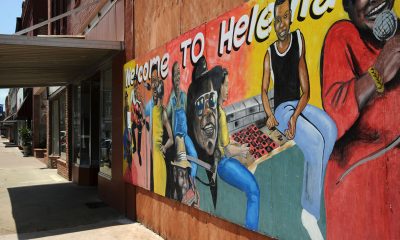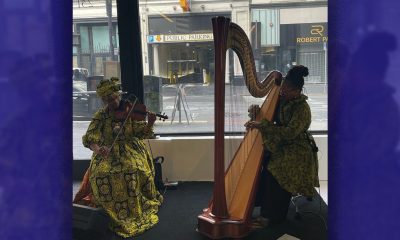Entertainment
‘King of the Blues’ Blues Legend B.B. King Dead at Age 89

In this Feb. 16, 2007 file photo, B.B. King performs at the Wicomico Youth and Civic Center, in Salisbury, Md. King died Thursday, May 14, 2015, peacefully in his sleep at his Las Vegas home at age 89, his lawyer said. (Matthew S. Gunby/The Daily Times via AP)
Ken Ritter, ASSOCIATED PRESS
LAS VEGAS (AP) — B.B. King, whose scorching guitar licks and heartfelt vocals made him the idol of generations of musicians and fans while earning him the nickname King of the Blues, died late Thursday at home in Las Vegas. He was 89.
His attorney, Brent Bryson, told The Associated Press that King died peacefully in his sleep at 9:40 p.m. PDT. He said funeral arrangements were underway.
Clark County Coroner John Fudenberg confirmed the death.
King’s eldest surviving daughter Shirley King of the Chicago area said she was upset that she didn’t have a chance to see her father before he died.
Although he had continued to perform well into his 80s, the 15-time Grammy winner suffered from diabetes and had been in declining health during the past year. He collapsed during a concert in Chicago last October, later blaming dehydration and exhaustion. He had been in hospice care at his Las Vegas home.
For most of a career spanning nearly 70 years, Riley B. King was not only the undisputed king of the blues but a mentor to scores of guitarists, who included Eric Clapton, Otis Rush, Buddy Guy, Jimi Hendrix, John Mayall and Keith Richards. He recorded more than 50 albums and toured the world well into his 80s, often performing 250 or more concerts a year.
King played a Gibson guitar he affectionately called Lucille with a style that included beautifully crafted single-string runs punctuated by loud chords, subtle vibratos and bent notes.
The result could bring chills to an audience, no more so than when King used it to full effect on his signature song, “The Thrill is Gone.” He would make his guitar shout and cry in anguish as he told the tale of forsaken love, then end with a guttural shouting of the final lines: “Now that it’s all over, all I can do is wish you well.”
His style was unusual. King didn’t like to sing and play at the same time, so he developed a call-and-response between him and Lucille.
“Sometimes I just think that there are more things to be said, to make the audience understand what I’m trying to do more,” King told The Associated Press in 2006. “When I’m singing, I don’t want you to just hear the melody. I want you to relive the story, because most of the songs have pretty good storytelling.”
A preacher uncle taught him to play, and he honed his technique in abject poverty in the Mississippi Delta, the birthplace of the blues.
“I’ve always tried to defend the idea that the blues doesn’t have to be sung by a person who comes from Mississippi, as I did,” he said in the 1988 book “Off the Record: An Oral History of Popular Music.”
“People all over the world have problems,” he said. “And as long as people have problems, the blues can never die.”
Fellow travelers who took King up on that theory included Clapton, the British-born blues-rocker who collaborated with him on “Riding With the King,” a best-seller that won a Grammy in 2000 for best traditional blues album.
Singer Smokey Robinson praised the music legend.
“The world has physically lost not only one of the greatest musical people ever but one of the greatest people ever. Enjoy your eternity,” Robinson said.
Still, the Delta’s influence was undeniable. King began picking cotton on tenant farms around Indianola, Mississippi, before he was a teenager, being paid as little as 35 cents for every 100 pounds, and was still working off sharecropping debts after he got out of the Army during World War Two.
“He goes back far enough to remember the sound of field hollers and the cornerstone blues figures, like Charley Patton and Robert Johnson,” ZZ Top guitarist Billy Gibbons once told Rolling Stone magazine.
King got his start in radio with a gospel quartet in Mississippi, but soon moved to Memphis, Tennessee, where a job as a disc jockey at WDIA gave him access to a wide range of recordings. He studied the great blues and jazz guitarists, including Django Reinhardt and T-Bone Walker, and played live music a few minutes each day as the “Beale Street Blues Boy,” later shortened to B.B.
Through his broadcasts and live performances, he quickly built up a following in the black community, and recorded his first R&B hit, “Three O’Clock Blues,” in 1951.
He began to break through to white audiences, particularly young rock fans, in the 1960s with albums like “Live at the Regal,” which would later be declared a historic sound recording worthy of preservation by the Library of Congress’ National Recording Registry.
He further expanded his audience with a 1968 appearance at the Newport Folk Festival and when he opened shows for the Rolling Stones in 1969.
King was inducted into the Blues Foundation Hall of Fame in 1984, the Rock and Roll Hall of Fame in 1987 and received the Songwriters Hall of Fame Lifetime Achievement Award in 1990. He received the Presidential Medal of Freedom from President George W. Bush, gave a guitar to Pope John Paul II and had President Barack Obama sing along to his “Sweet Home Chicago.”
Other Grammys included best male rhythm ‘n’ blues performance in 1971 for “The Thrill Is Gone,” best ethnic or traditional recording in 1982 for “There Must Be a Better World Somewhere” and best traditional blues recording or album several times. His final Grammy came in 2009 for best blues album for “One Kind Favor.”
Through it all, King modestly insisted he was simply maintaining a tradition.
“I’m just one who carried the baton because it was started long before me,” he told the AP in 2008.
Born Riley B. King on Sept. 16, 1925, on a tenant farm near Itta Bena, Mississippi, King was raised by his grandmother after his parents separated and his mother died. He worked as a sharecropper for five years in Kilmichael, an even smaller town, until his father found him and took him back to Indianola.
“I was a regular hand when I was 7. I picked cotton. I drove tractors. Children grew up not thinking that this is what they must do. We thought this was the thing to do to help your family,” he said.
When the weather was bad and he couldn’t work in the cotton fields, he walked 10 miles to a one-room school before dropping out in the 10th grade.
After he broke through as a musician, it appeared King might never stop performing. When he wasn’t recording, he toured the world relentlessly, playing 342 one-nighters in 1956. In 1989, he spent 300 days on the road. After he turned 80, he vowed he would cut back, and he did, somewhat, to about 100 shows a year.
He had 15 biological and adopted children. Family members say 11 survive.
___
Associated Press writers John Rogers and Mesfin Fekadu in Los Angeles contributed to this report.
Copyright 2015 The Associated Press. All rights reserved. This material may not be published, broadcast, rewritten or redistributed.
###
Entertainment
O.J. Simpson, 76, Dies of Prostate Cancer
Orenthal James (O.J.) Simpson, who rose to fame as a college football player who went on to the NFL and parlayed his talents in acting and sportscasting, succumbed to prostate cancer on April 10, his family announced.
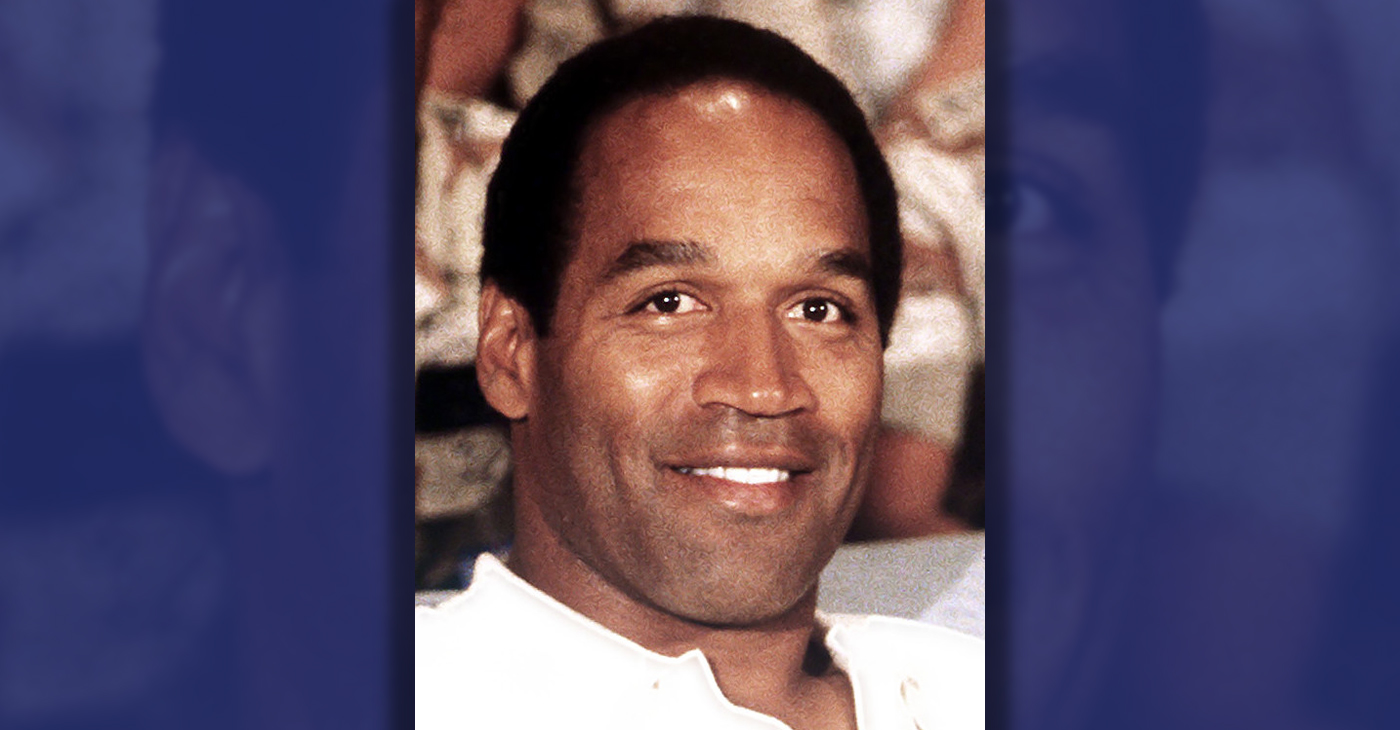
By Post Staff
Orenthal James (O.J.) Simpson, who rose to fame as a college football player who went on to the NFL and parlayed his talents in acting and sportscasting, succumbed to prostate cancer on April 10, his family announced.
Born and raised in San Francisco, the Galileo High School graduate was recruited by the University of Southern California after he was on a winning Junior College All-American team.
At USC, he gained wide acclaim as a running back leading to him becoming the No. 1 pick in the AFL-NFL draft in 1969 and joining the Buffalo Bills, where he had demanded – and received — the largest contract in professional sports history: $650,000 over five years. In 1978, the Bills traded Simpson to his hometown team, the San Francisco 49ers, retiring from the game in 1979.
Simpson’s acting career had begun before his pro football career with small parts in 1960s TV (“Dragnet”) before “Roots” and film (“The Klansman,” “The Towering Inferno,” Capricorn One”).
He was also a commentator for “Monday Night Football,” and “The NFL on NBC,” and in the mid-1970s Simpson’s good looks and amiability made him, according to People magazine, “the first b\Black athlete to become a bona fide lovable media superstar.”
The Hertz rent-a-car commercials raised his recognition factor while raising Hertz’s profit by than 50%, making him critical to the company’s bottom line.
It could be said that even more than his success as a football star, the commercials of his running through airports endeared him to the Black community at a time when it was still unusual for a Black person to represent a national, mainstream company.
He remained on Hertz team into the 1990s while also getting income endorsing Pioneer Chicken, Honey Baked Ham and Calistoga water company products and running O.J. Simpson Enterprises, which owned hotels and restaurants.
He married childhood sweetheart Marguerite Whitley when he was 19 and became the father of three children. Before he divorced in 1979, he met waitress and beauty queen Nicole Brown, who he would marry in 1985. A stormy relationship before, during and after their marriage ended, it would lead to a highway car chase as police sought to arrest Simpson for the murder by stabbing of Brown and her friend Ron Goldman in 1994.
The pursuit, arrest, and trial of Simpson were among the most widely publicized events in American history, Wikipedia reported.
Characterized as the “Trial of the Century,” he was acquitted by a jury in 1995 but found liable in the amount of $33 million in a civil action filed by the victims’ families three years later.
Simpson would be ensnared in the criminal justice system 12 years later when he was arrested after forcing his way into a Las Vegas hotel room to recover sports memorabilia he believed belonged to him.
In 2008, he received a sentence of 33 years and was paroled nine years later in 2017.
When his death was announced, Simpson’s accomplishments and downfalls were acknowledged.
Sports analyst Christine Brennan said: “… Even if you didn’t love football, you knew O.J. because of his ability to transcend sports and of course become the businessman and the pitchman that he was.
“And then the trial, and the civil trial, the civil case he lost, and the fall from grace that was extraordinary and well-deserved, absolutely self-induced, and a man that would never be seen the same again,” she added.
“OJ Simpson played an important role in exposing the racial divisions in America,” attorney Alan Dershowitz, an adviser on Simpson’s legal “dream team” told the Associated Press by telephone. “His trial also exposed police corruption among some officials in the Los Angeles Police Department. He will leave a mixed legacy. Great athlete. Many people think he was guilty. Some think he was innocent.”
“Cookie and I are praying for O.J. Simpson’s children … and his grandchildren following his passing. I know this is a difficult time,” Magic Johnson said on X.
“I feel that the system failed Nicole Brown Simpson and failed battered women everywhere,” attorney Gloria Allred, who once represented Nicole’s family, told ABC News. “I don’t mourn for O.J. Simpson. I do mourn for Nicole Brown Simpson and her family, and they should be remembered.”
Simpson was diagnosed with prostate cancer about a year ago and was undergoing chemotherapy treatment, according to Pro Football Hall of Fame President Jim Porter. He died in his Las Vegas, Nevada, home with his family at his side.
He is survived by four children: Arnelle and Jason from his first marriage and Sydney and Justin from his second marriage. He was predeceased son, Aaren, who drowned in a family swimming pool in 1979.
Sources for this report include Wikipedia, ABC News, Associated Press, and X.
Activism
Oakland Post: Week of April 10 – 16, 2024
The printed Weekly Edition of the Oakland Post: Week of April 10 – 16, 2024

To enlarge your view of this issue, use the slider, magnifying glass icon or full page icon in the lower right corner of the browser window. ![]()
Activism
Oakland Post: Week of April 3 – 6, 2024
The printed Weekly Edition of the Oakland Post: Week of April 3 – 6, 2024

To enlarge your view of this issue, use the slider, magnifying glass icon or full page icon in the lower right corner of the browser window. ![]()
-

 Activism4 weeks ago
Activism4 weeks agoOakland Post: Week of March 20 – 26, 2024
-

 #NNPA BlackPress3 weeks ago
#NNPA BlackPress3 weeks agoCOMMENTARY: D.C. Crime Bill Fails to Address Root Causes of Violence and Incarceration
-

 #NNPA BlackPress3 weeks ago
#NNPA BlackPress3 weeks agoMayor, City Council President React to May 31 Closing of Birmingham-Southern College
-

 #NNPA BlackPress3 weeks ago
#NNPA BlackPress3 weeks agoFrom Raids to Revelations: The Dark Turn in Sean ‘Diddy’ Combs’ Saga
-

 #NNPA BlackPress3 weeks ago
#NNPA BlackPress3 weeks agoCOMMENTARY: Lady Day and The Lights!
-

 #NNPA BlackPress3 weeks ago
#NNPA BlackPress3 weeks agoBaltimore Key Bridge Catastrophe: A City’s Heartbreak and a Nation’s Alarm
-

 #NNPA BlackPress3 weeks ago
#NNPA BlackPress3 weeks agoBaltimore’s Key Bridge Struck by Ship, Collapses into Water
-

 Activism3 weeks ago
Activism3 weeks agoOakland Post: Week of March 27 – April 2, 2024

